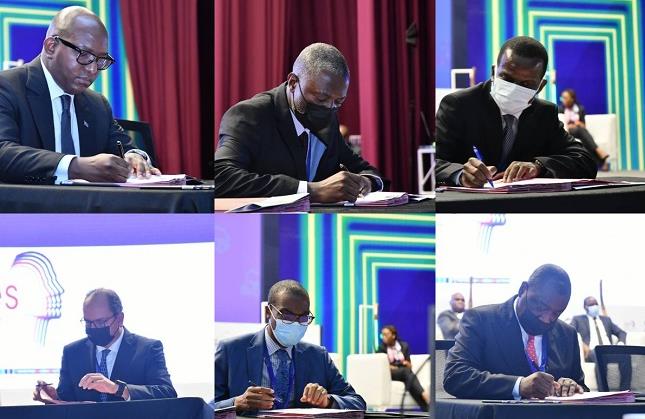A battery minerals industry is set to take off in the Democratic Republic of Congo (DRC) after a series of firm commitments were sealed at a two-day business forum in DRC’s capital, Kinshasa.

The government of DRC and several development banks and partners including United Nations Economic Commission for Africa (ECA), the African Export-Import Bank (Afreximbank), the African Finance Corporation (AFC), the African Development Corporation (ADC), and AVZ Minerals signed the agreement which set the pace for the establishment of an industry of electric battery minerals and electric vehicles and clean energy that will serve Africa and the rest of the world.
DRC’s Prime Minister, Jean-Michel Sama Lukonde, said the deal provided an opportunity to pilot “government’s policy to develop a regional value chain around the electric battery industry.”
According to ECA’s Under-Secretary-General and Executive Secretary, Vera Songwe, the agreement will enable the country to harness its mineral resource wealth to sustainably commence low-emissions-production of battery precursors an input of lithium-ion batteries, used in electric vehicles.
“The DRC is at the heart of the battery value chain, as it is home to about 70% of world’s cobalt reserves. The country’s mining sector currently accounts for 98% of exports, 18% of GDP, and 11% of jobs. If the DRC captures 20% of the market share for battery production, it will add around US$54 billion to its income and raise its GDP tremendously.” Songwe said during the DRC-Africa Business Forum held from November 24 to 25, 2021 online and in Kinshasa under the theme: “Fostering the development of a battery electric vehicle (BEV) and renewable energy industrial value chain and market in Africa.”
“From now on, there is no question of going backwards. We must take action. This is the moment, this is the time,” Songwe said stressing on the need for project, which is planned to kick-off within the next two years, to be effective and efficient.
President Hakainde Hichilema of neighbouring Zambia, Africa’s second-largest copper producer, told the forum his country was ready to work with Congo and others in the region to develop Africa’s industrial capacity.
“We need to harmonize our continental strategy and value chain. Zambia is ready to work with all African countries,” he said.
President Felix Tshisekedi said DRC’s minerals put the country in a “strategic position to influence the global renewable energy transition.” He urged his African counterparts and global stakeholders to “seize this opportunity” to jointly invest in increasing Africa’s share of the BEV and renewable energy value chain, while creating jobs at home and fostering regional integration.
The importance of local beneficiation and localisation of the value chain was emphasised by Markus Thill, Bosch Africa’s President and VP of the African Association of Automotive Manufacturers (AAAM), who announced that “AAAM is working with AfCFTA Secretariat to produce at least 5million vehicles in Africa for Africa by 2025.”
A new study by BloombergNEF shows that building a 10,000 metric-ton battery precursor plant in the DRC would cost $39 million. A similar plant in the US, China and Poland would cost an estimated $120 million, $112 million and $65 million, respectively. The study on “The Cost of Producing Battery Precursors in the DRC” indicates that a precursor plant in the DRC would produce almost 30% lower emissions than in China, given proximity to the mineral resources needed to produce the precursors.
But for an for an effective ecosystem for the battery, electric vehicles and renewable energy value chain in the country, Special Economic Zones (SEZ) have to be independent, members of government of DRC and private sector leaders agreed during a round table discussion organised on the sideline of the forum
The independence of SEZ will increase confidence in the initiative and create the right balance of incentives for investors from the other countries, said Antonio Pedro, ECA’s Deputy Executive Secretary who moderated the round table discussions.
“To create a functional battery plant in DRC, the government must create the right regulatory and legal framework to attract foreign direct investment and apply the same for the local investors,” the ECA quoted Mr Pedro as saying, adding that ensuring institutional cohesiveness is also important for industrial policy.
“There is clear reason to invest in DRC, and extensive potential for returns, and lower costs in comparison with other countries. The next generation is involved in leadership, and is looking to change the narrative of the country,” said Patrick Muyaya, DRC’s Minister of Communication and Media, who took part in the discussions.
The study on “The Cost of Producing Battery Precursors in the DRC” carried out by BloombergNEF was commissioned by the UN Economic Commission for Africa, Afreximbank, Africa Development Bank Group, the Africa Finance Corporation (AFC), the Arab Bank for Economic Development in Africa, the African Legal Support Facility (ALSF), and the UN Global Compact.
The DRC-Africa Business Forum featured a policy dialogue with the presidents of DRC and Zambia, and high-level representatives from Tanzania, Morocco, ECA, Afreximbank, Africa Finance Cooperation, African Development Bank Group, Bosch Africa, African Union Commission, The Arab Bank for Economic Development in Africa, and AVZ Minerals Ltd.
By Arison Tamfu
